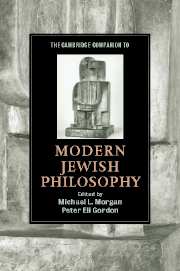Book contents
- Frontmatter
- 1 Introduction: Modern Jewish Philosophy, Modern Philosophy, and Modern Judaism
- 2 Baruch Spinoza and the Naturalization of Judaism
- 3 The Liberalism of Moses Mendelssohn
- 4 Jewish Philosophy after Kant The Legacy of Salomon Maimon
- 5 Hermann Cohen: Judaism and Critical Idealism
- 6 Self, Other, Text, God: The Dialogical Thought of Martin Buber
- 7 Franz Rosenzweig and the Philosophy of Jewish Existence
- 8 Leo Strauss and Modern Jewish Thought
- 9 Messianism and Modern Jewish Philosophy
- 10 Ethics, Authority, and Autonomy
- 11 Joseph Soloveitchik and Halakhic Man
- 12 Emmanuel Levinas: Judaism and the Primacy of the Ethical
- 13 Emil Fackenheim, the Holocaust, and Philosophy
- 14 Evil, Suffering, and the Holocaust
- 15 Revelation, Language, and Commentary: From Buber to Derrida
- 16 Feminism and Modern Jewish Philosophy
- Bibliography
- Index
10 - Ethics, Authority, and Autonomy
Published online by Cambridge University Press: 28 September 2007
- Frontmatter
- 1 Introduction: Modern Jewish Philosophy, Modern Philosophy, and Modern Judaism
- 2 Baruch Spinoza and the Naturalization of Judaism
- 3 The Liberalism of Moses Mendelssohn
- 4 Jewish Philosophy after Kant The Legacy of Salomon Maimon
- 5 Hermann Cohen: Judaism and Critical Idealism
- 6 Self, Other, Text, God: The Dialogical Thought of Martin Buber
- 7 Franz Rosenzweig and the Philosophy of Jewish Existence
- 8 Leo Strauss and Modern Jewish Thought
- 9 Messianism and Modern Jewish Philosophy
- 10 Ethics, Authority, and Autonomy
- 11 Joseph Soloveitchik and Halakhic Man
- 12 Emmanuel Levinas: Judaism and the Primacy of the Ethical
- 13 Emil Fackenheim, the Holocaust, and Philosophy
- 14 Evil, Suffering, and the Holocaust
- 15 Revelation, Language, and Commentary: From Buber to Derrida
- 16 Feminism and Modern Jewish Philosophy
- Bibliography
- Index
Summary
The crux of the doctrine of autonomy is easy to state: “Man,” as Kant tells us in Religion within the Limits of Reason Alone, “must make or have made himself into whatever, in a moral sense, whether good or evil, he is or is to become.” Simply put, God can command us to obey certain laws and threaten us with punishment if we refuse; but only we bear responsibility for what we do. In the words of Ezekiel (18:20): “the righteousness of the righteous shall be his own, and the wickedness of the wicked shall be his own.” Though God bids us to turn from wickedness and sanctify ourselves, sanctification cannot be vicarious: it makes sense only if it comes from within.
What kind of being is able to do this? The answer is a moral agent, something that can take responsibility for its actions and change direction when it decides that its actions are not what they should be. Although it is easy for us to take moral agency for granted, it is worth recalling that at one point it was a revolutionary idea. The first formulation of the Ten Commandments (Exodus 20:5) claims that God will punish children for the iniquity of their parents. Ezekiel’s point is that this cannot be right: each person must answer for her own actions. To understand the doctrine of autonomy is to recognize, with Hermann Cohen, that it is nothing more than an extension of Ezekiel’s insight. Once a person becomes responsible for herself, she becomes master of herself. She cannot inherit someone else’s sin, and if she commits a sin of her own, only she has the power to atone for it.
- Type
- Chapter
- Information
- The Cambridge Companion to Modern Jewish Philosophy , pp. 192 - 208Publisher: Cambridge University PressPrint publication year: 2007
- 2
- Cited by

